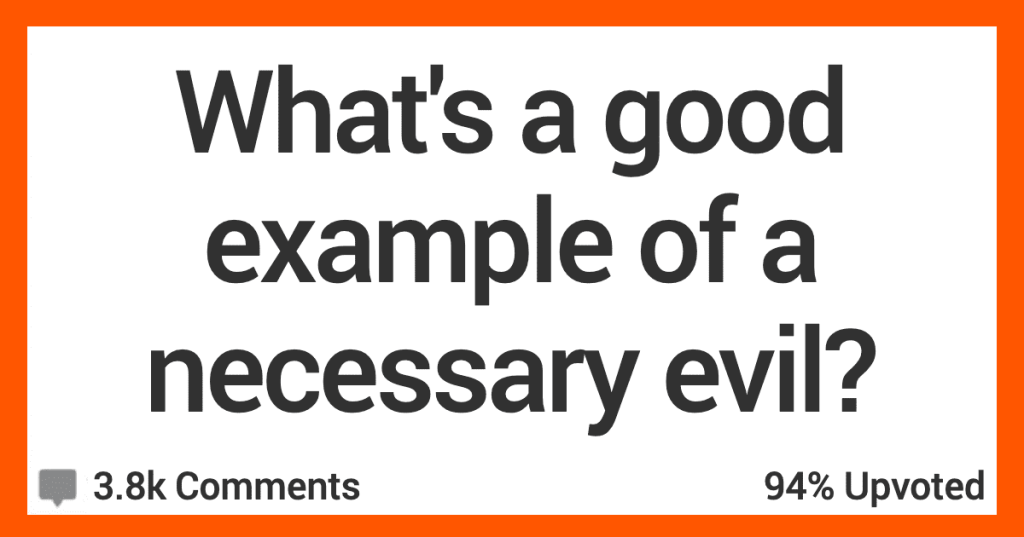It’s a fact of life that there are some things that are necessary evils:
Taxes, government, laws, etc.
And everyone has their own opinions on this divisive subject.
Let’s see what AskReddit users had to say about this.
1. It’s natural.
“The ability for the human body to feel pain.
As exploitable as it is, without this ability to feel pain the life expectancy would go way down because people often wouldn’t realize something was wrong with their body until it was too late to do anything about it.
Pain is the body’s natural defense mechanism to protect itself against further injury.”
2. Sad!
“Thar air in you bag of chips stops the chips from getting crushed on delivery.
We all wish there could just be more chips but you need that air.”
3. Gotta do it.
“Chemotherapy.
I will never forget the feeling of being so unbelievably sick, weak and helpless as I stood in front of the hospital about to go in for my next transfusion. Every rational part of me was calmly telling me it was working and it was the right decision to keep going, but the baser instincts were screaming at me to run as far and fast as I could away from this place.
It’s a tough mental struggle to willingly and knowing poison yourself over a period of months while trying to convince yourself it’s going to save your life.
That’s the side of chemo I think a lot of people don’t realise until they face it themselves and it’s one that is incredibly hard to explain to anyone who hasn’t gone through it.”
4. Humility is good.
“If you don’t experience being humbled, you’re all the more likely to not only let success go to your head but to take things for granted.”
5. It’s the law.
“A lawyer defending an alleged r**ist/m**derer/ped**hile/etc.
I had a lawyer friend describe it best as the job isn’t to get people off, but to ensure that they get a fair trial and full treatment of the law.
Basically, just not getting f**ked by the system, guilty or not.”
6. Good point.
“Farting.
It stinks and it’s embarrassing but we’d be in constant agony without it.”
7. The good and the bad.
“Sadness
You can’t be happy all the time. It isn’t healthy.
You have to take the good with the bad. You learn to cope and move on from it.”
8. Yes.
“Euthanasia.
You feel more than evil to be the one to make the decision, almost like you’re playing God.
But it’s necessary to save something defenceless that you love from a prolonged painful, miserable end.”
9. Testing.
“H**e to say it, but animal testing.
No matter how many simulations we run, products still need to be tested before they’re sold, especially medicines.”
10. True.
“Government.
Freedom is beneficial for any society, but in order to function it needs some overseeing structure.
Otherwise it descends into anarchy, which is associated with chaos for a reason.”
11. Amen!
“Taxes.
Taxes are the price we pay for civilization.”
12. History lesson.
“If we manage not to engage in a nuclear war, we will probably look back on the century or centuries we had them pointed at each other as being the single most important factor in not engaging in massive warfare every decade.
People forget that the firebombing of Tokyo k**led more people than Hiroshima and Nagasaki combined, and it was nothing compared to Dresden, and that was comparable to Nanjing, which was nothing compared to the Holocaust, which was nothing compared to the Eastern front, in which an estimated 30 million people d**d.
Before that, we had WW1, which setup the political and economic stage for WW2. Before WW1, we had various wars of colonialism that setup the imperial rivalries from Europe.
After WW2, the entire world seemed to be teetering on the edge of another global conflict every decade that was only truly staved off by the possibility that the entire human race would be annihilated if such an event occurred.
People on every continent have engaged in brutal wars ever since, but the specter of global war and the potential for nuclear holocaust has tempered these conflicts immensely.
If we manage to outgrow the need to be pointing a gun at each other’s heads, our great-great grandchildren might think of us as having been silly, but they should have an appreciation that their peace is because we came close to ending it all.”
What do you think about this?
Let us know in the comments.
We’d love to hear from you!






